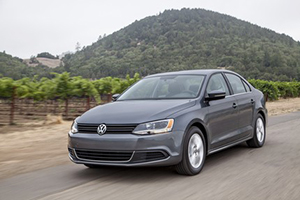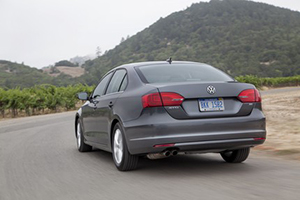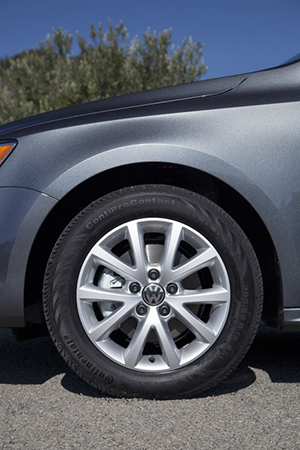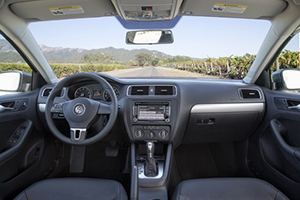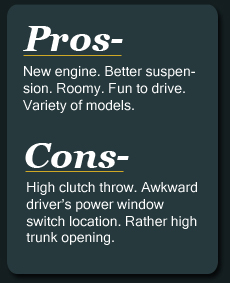2014 Volkswagen Jetta
The
2014 Volkswagen Jetta has been improved with a zesty new engine and
independent rear suspension for better ride and handling.
Prices: Approximately $15,545-$27,415
The Volkswagen Jetta is an affordable German-engineered compact sedan,
which might partially explain why it is VW’s most popular
model here.
Major improvements for 2014 include a new turbocharged and intercooled
1.8-liter four-cylinder engine that develops 170 horsepower and 184
pound-feet of torque. It has direct fuel injection and replaces a
2.5-liter inline five-cylinder engine with the same horsepower.
The new engine delivers better fuel economy than the five-cylinder: an
estimated 26 miles per gallon in the city and 36 on highways with a
five-speed manual transmission. A six-speed manual and efficient
automatic transmissions also are available.
Enabling the front-wheel-drive Jetta to be fun to drive are a new
independent multi-link rear suspension and electro-mechanical steering,
which replaces a hydraulic setup. While quick and precise, the steering
didn’t quite have the feel of BMW, Audi or Mercedes steering.
The Jetta comes in a variety of trim levels and models, including a
diesel-engine version and a gas/electric hybrid. My SE lacked optional
blind-spot monitoring and didn’t have the backup camera
offered in some Jettas. Still, it had a good number of upscale items.
I tested an $18,895 Jetta SE with the new engine and a five-speed
manual transmission. I found acceleration to be strong, with good
overall torque across the rev band and no perceptible turbo
“lag.”
I found third gear best for passing on highways and for quick moves in
town. Fourth gear is acceptable for moderately fast 65-75 m.p.h.
passing, but lugs the engine at 30 m.p.h.. Fifth is an overdrive gear
that’s nearly useless for safe passing but results in a
gas-sipping 1,900 r.p.m. tachometer reading at 65 m.p.h.
The light clutch has a long throw that a driver must become familiar
with to avoid stalling the engine, but the same can be said for BMW
clutches. Those who spend lots of time with the Jetta in stop-and-go
traffic should opt for an automatic.
While my test Jetta SE wasn’t as performance-oriented as the
higher-line Jetta GLI, which has more power, a modified suspension and
grippier tires, it came close to being a sports sedan—thanks
largely to the new suspension.
The SE confidently handled sweeping curves taken at higher speeds with
no body lean. Helping stability were electronic stability control and
an anti-slip system. The Jetta SE also has an electronic differential
lock.
The ride was supple, and an anti-lock braking system assured no-fuss
sudden stops. The brake pedal causes the brakes to bite early and
surely during routine stops.
Easily gripped door handles allow quick entry to the quiet interior,
which has supportive front seats, easily read gauges, adjustable
steering wheel and handy rotary sound system controls. Even the
dashboard ventilation vents are well-placed, and there are a fair
number of cabin storage areas.
While console cupholders are easily reached, the driver’s
power window door switches are awkwardly placed because those for the
front windows are set too high. They occasionally caused me to lower a
rear window instead of a front one. That’s annoying.
The cockpit has been improved since the current-generation Jetta
arrived for 2011 and is roomy—especially in back. However,
the center of the backseat is stiff and best left to the fold-down
armrest, which contains dual cupholders.
The SE’s interior is upscale in the no-nonsense German
manner. It has air conditioning, leatherette seating surfaces, decent
sound system, power reclining front seats, adjustable front center
armrest, cruise control, power windows, remote keyless locking system,
intermittent wipers and a trip computer.
The power heatable exterior mirrors with turn signals are a nice touch,
but their interior control works in a sloppy manner.
Safety items include front/rear side curtain protection head impact air
bags and daytime running lights.
The rear seat has a moderately large pass-through opening from the
cargo area for skis and such. And 60/40 split folding rear seatbacks
flip forward and sit flat to greatly increase cargo capacity. The
opening between the cargo and rear-seat area is large with the
seatbacks flipped forward.
The SE’s extremely heavy hood should utilize hydraulic
struts, but instead uses manual hinges and is held open with just a
prop rod. But the engine compartment is designed for easy access to
fluid filler areas for those who want to check the engine oil level and
such.
With its improvements, the Volkswagen Jetta should continue to be a
strong-seller.

